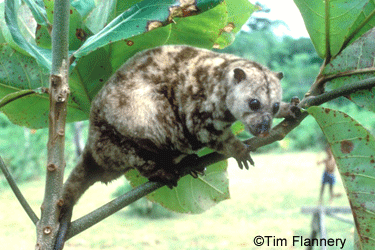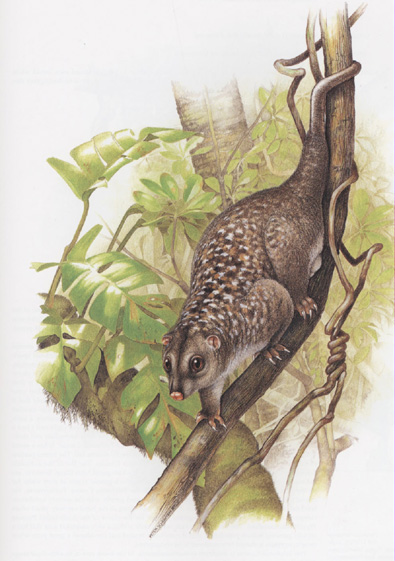Woodlark Island is a small, Pacific island found off the coast of Papua New Guinea. Unlike many other islands, Woodlark has retained a dense blanket of tropical rainforest, an ecosystem which is home to a wealth of endangered species. Many of the island’s species (at least 42) are found only here, and thus face the risk of becoming globally extinct if their habitats are disturbed and their populations dwindle. Unfortunately, the Malaysian company Karridale Limited is currently planning to log over half the islands rainforest, increasing the likelihood of this outcome. Those species identified to be endemic include 19 species of land snail, 7 frogs, 4 reptiles and 7 plant species. The most famous of all the endemic species is the Woodlark cuscus (Phalanger lullulae), an arboreal mammal unique among marsupials in its distinctive colouration. This is also an EDGE species (ranked 217th on the EDGE mammals list) because it is highly evolutionarily distinct and is classified as endangered by the IUCN Red List (www.iucnredlist.org/details/16846/0).
Scientists are convinced that due to a lack of accurate biological surveying of the island, there are many more species to be discovered, some of which are likely to also be endemic. Logging plans have, to date, been authorised by the National Forest Authority and are awaiting provincial approval. If this is obtained, clear-cut logging activity will destroy many of the habitats these species are dependent on, and will subsequently result in the loss of organisms and an overall decline in local biodiversity. In addition, such activity is likely to degrade the quality of remaining available habitat, and those habitats left untouched will not be large enough to support all of the island’s wildlife.
Dr. Fred Kraus from the University of Michigan suggests a more selective and managed logging approach would be less detrimental to local wildlife than clear-cut logging. In addition, this may benefit local communities who rely on rainforest resources for hunting and building homes. This does not however appear to be of interest to those planning to log the island. Local’ people feel there has been a lack of transparency with regards to the intentions of such timber companies, and unlike much of the rest of Papua New Guinea, Woodlark islanders do not legally own their land. As a result, there is little the locals can do to protect their forests, which have also been threatened in the past. In 2008 plans to convert 70% of Woodlark’s forest to palm oil plantations were halted following a campaign which gained international support and wide media coverage (https://www.edgeofexistence.org/edgeblog/?p=382). A similar rescue operation is required once more, and is of particular urgency as loggers have already set up their camps and machinery on the Island. Please share this blog and help us raise awareness of the proposed logging plans which pose a threat to so many unique and endangered species.

